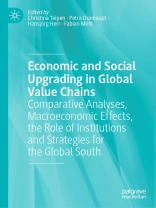This book investigates how global value chain governance, public institutions and strategies in the area of industrial policy and industrial relations by stakeholders such as national or global trade unions, governments, companies or international NGOs shape upgrading in the Global South. A special feature is its interdisciplinarity, combining sociological, economic, legal and political dimensions. Case studies systematically compare different industry trajectories. Furthermore, it encompasses far-reaching insights into the role of global value chains for development, economic catching-up of countries and socio-political aspects such as working conditions and interest representation.
Inhaltsverzeichnis
Chapter 1. Introduction: Governance, Rent-seeking and Upgrading in Global Value Chains.- Part I: Interdisciplinary Theoretical Contributions – Framing The Debate.- Chapter 2. Contemporary Globalization and Value Systems: What Gains for Developing Countries?.- Chapter 3. Global Value Chains – a Panacea for Development?.- Chapter 4. Social Upgrading in Global Value Chains – the Role of Labor and Industrial Relations.- Chapter 5. Embeddedness of Power Relations in Global Value Chains.- Chapter 6. Social Upgrading in Global Value Chains from a Perspective of Gendered and Intersectional Social Inequalities.- Part II: Insights From Different National Sectors.- Chapter 7. Social Upgrading, a Mixed Bag: The Indian IT Software Sector.- Chapter 8. India’s Automobile and Textile Industries in Global Value Networks: An Assessment.- Chapter 9. Collective Bargaining During and After Apartheid: Economic and Social Upgrading in the Automobile Global Value Chains in South Africa.- Chapter 10. Economic and Social Upgrading in Global Value Chains: the Automotive Industry in Brazil.- Chapter 11. Locked Between Buyer-driven Global Value Chains and State Control: An Analysis of the Stagnation of Economic and Social Upgrading in the Garment and Electronics Industries in Vietnam.- Chapter 12. Foxconnisation of Automobile Manufacturing? Production Networks and Regimes of Production in the Electric Vehicle Industry in China.- Chapter 13. Few Opportunities for Smallholders for Upgrading in Agricultural Value Chains.- Part III: Strategic Consequences And Solutions From Different Backgrounds.- Chapter 14. The Governance Challenges of Social Upgrading in Apparel Global Value Chains in the Context of a Sourcing Squeeze and the COVID-19 Pandemic.- Chapter 15. Social upgrading in the Bangladeshi garment sector since Rana Plaza: Why some governance matters more than others.- Chapter 16. China’s Leverage of Industrial Policy to Absorb Global Value Chains in Emerging Industries.- Chapter 17. New Business and Human Rights Laws – Support for Social Upgrading?.- Chapter 18. Lessons of the Indonesian Freedom of Association Protocol.- Chapter 19. From Corporate Social Responsibility Towards Working Solutions: A Comment by the Former Managing Director of “Action, Collaboration, Transformation”. Part IV: Conclusions And Outlook.- Chapter 20. Comparing national and industry-specific trajectories of economic and social upgrading as well as various strategic solutions.- Chapter 21. Economic and Social Effects of the COVID-19 Pandemic and the Future of Global Value Chains.
Über den Autor
Christina Teipen is Professor for social sciences with a focus on economic sociology at HWR Berlin (Berlin School of Economics and Law).
Petra Dünhaupt is a research associate and lecturer at HWR Berlin.
Hansjörg Herr is Professor (retired) for supranational integration at HWR Berlin.
Fabian Mehl is a research associate and lecturer at HWR Berlin.












